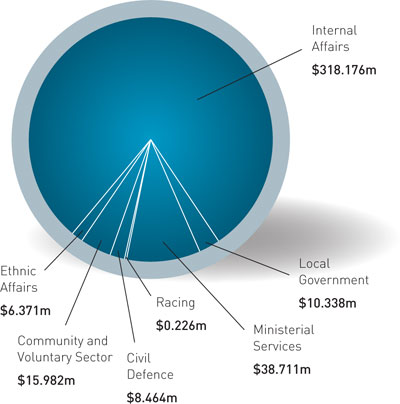Resource material › Corporate Publications › Annual Report 2013-14Pūrongo ā Tau
Overview of the year
- Previous – Our purpose, principles and behaviours
- Table of Contents
- Next – Part A: Contribution to outcomes and objectives
On this page
This section provides an introduction to the Department and an overview of our strategic direction and achievements over the past year
Chief Executive’s Overview

This has been a year of significant achievement for the Department. We have made good progress in our role leading government information and technology services while continuing to deliver on our purpose of serving and connecting people, communities and government to build a safe, prosperous and respected nation.
Connecting people and government
By 2017, the New Zealand government wants public services to be radically transformed for the benefit of all New Zealanders, and information and communication technology (ICT) is a key tool to make this possible. Our responsibility for providing functional leadership for all-of-government ICT gives us an important leadership role on this journey.
We have had a successful year. A number of State services agencies have adopted our Common Capabilities framework to standardise and streamline their ICT systems. We have also designed and launched an assurance model for ICT operations and ICT programmes and projects to help Government agencies identify and manage their risks so their investments in ICT systems can produce the expected benefits. The scope of our ICT functional leadership mandate was recently extended to a further 27 agencies, enabling the Department to work with 60 agencies on their ICT investment plans.
As the lead agency for Better Public Services Result 10, we have continued our work with agencies to achieve the Result 10 target that “by 2017 an average of 70 per cent of New Zealanders’ most common transactions with government will be completed in a digital environment”. The collective efforts of the eight agencies participating in Result 10 have seen an increase in the average number of digital transactions. But Result 10 is more than just the target measure.
To support the redesign of Government’s existing digital services, we have developed the Result 10 Blueprint as Government policy for digital service delivery of State services to New Zealanders. The Blueprint contains 10 priority actions aimed at putting the customer at the centre, increasing system capability, and supporting New Zealanders through the digital transition. We are now working with all Public Service and non-Public Service departments as well as State Service agencies to align their service design, investment and delivery plans to these actions.
This stronger central leadership of ICT, combined with greater collaboration with agencies and industry, will drive faster service improvements, lower costs to agencies and support a citizen-centric approach to the way New Zealanders engage with government services.
We have also made steady advances with RealMe, a cornerstone service for government. RealMe makes it easy for people to prove their identity and safely share their personal information online, meaning government agencies can deliver integrated digital services to New Zealanders in a way which is safe, secure and private. This year RealMe expanded to the private sector and two banks have already gone live with the service.
It is crucial these activities have a strong foundation of information management, and one of our core functions is to properly manage the information we hold as well as advising other agencies on their own information management practices. We have been leading the programme to progressively build this capability across the State Sector, particularly in relation to the safety and integrity of New Zealanders’ private information. Our newly appointed Government Chief Privacy Officer will play a key role in leading an all-of-government approach to privacy and provide agencies with advice to help them build their own capability in this critical area.
Making a difference
In recognition of our considerable experience working with ethnic communities, this year the migrant and refugee community development programme Settling In was transferred from the Ministry of Social Development to the Office of Ethnic Affairs. Settling In is aimed at helping ethnic and refugee people become self-reliant in the community by focusing on projects and initiatives that remove the barriers to settlement they sometimes face in New Zealand. The diversity of the Department is a real strength for this ongoing programme.
The National Library, in conjunction with the Auckland Council and APN News and Media Limited, completed a major project to make 82 years of the New Zealand Herald available online through Papers Past. New Zealander Eleanor Catton drew on this rich resource to research the culture and life of 19th century West Coast for her 2013 Man Booker Prize winning novel The Luminaries.
The Department supported a number of official visits this year, including the successful visit from the Duke and Duchess of Cambridge in April. This involved staff from a variety of areas in the Department working closely with other agencies (including New Zealand Police, NZ Defence Force, Government House and Cabinet Office), as well as staff from Kensington Palace, to plan the programme and ensure appropriate logistics and protocols were in place for 40 engagements across five centres.
Through our Local Government responsibilities, we have taken a leadership role in improving the way central and local government work together, and we are making good progress. This closely aligns with our work to support the Government’s efforts to make local government more efficient, effective, and responsive to communities and ratepayers. Along with the Better Local Government reform programme – which has delivered one piece of legislation, with another proceeding through Parliament – we are also working on non-legislative improvements such as financial and non-financial performance indicators.
Our role in administering the Christchurch Earthquake Appeal Trust is nearing completion. The nearly $100 million donated to the Appeal has been allocated, three years after the first funds were granted, and we will continue to administer the Trust until the funding is paid out and any conditions are met.
Reducing social risk and harm, particularly around online channels, remains a priority for us. Our Censorship Compliance Unit developed the Digital Child Exploitation Filtering System in conjunction with private sector providers. The filter prevents people from accessing websites containing images of child sexual abuse. Despite being an opt-in tool for New Zealand internet service providers, it has 92 per cent coverage of internet usage in New Zealand.
Developing our people
All of these achievements are only possible because of the commitment and hard work of our staff. We have continued to drive the performance of our organisation by consciously investing in organisational culture and engagement.
A number of connected approaches have been taken to achieve this, including the next stage of our culture building activities. This is aimed at helping staff understand how their work contributes to, and connects with, the Department’s vision and direction by bringing together the four key elements of purpose, strategy, culture and engagement. We recently launched a new Capability Framework, which is a set of tools to support managers in their people-related activities, including recruitment, induction, performance assessment, development planning, and career progression. This investment is paying dividends. This year we have seen a further 42% increase in the number of engaged staff since our 2013 engagement survey, taking us to the average for the public service.
It is important that the Department’s workplaces adapt to our changing needs. This year we have put considerable effort into ensuring that where we work more closely reflects our culture, our principles and how we want to work together. We have particularly focused on upgrading our tools and systems. Once completed the Modernise Desktop Project will see the desktop and office software of our 2,400 computers upgraded, some with additional hardware improvements. We have also shifted to a shared financial services model with services provided by the Inland Revenue Department. This new operating model and purchase-to-pay system focuses on service delivery and quality while providing robust internal controls.
As a measure of our progress our recent Performance Improvement Framework Follow up Review found the Department was moving it the right direction and that we were clear about where we were going. I am pleased to see this, and I believe we are well placed to continue our journey. I would like to thank all my staff for their efforts in accomplishing so much this year.

Colin MacDonald
Chief Executive
Nature and Scope of Functions
We serve and connect people, communities and government to build a safe, prosperous and respected nation.
The Department of Internal Affairs has a historically wide scope of functions and responsibilities that:
- provide services and support directly to people and communities
- provide services and support to Government and public sector organisations.
Over this reporting period our responsibilities have included:
- providing strategy and support for all-of-government information and communications technology, and supporting our Chief Executive as the Government Chief Information Officer
- implementing the Government’s Better Public Service Result 10: New Zealanders can complete their transactions with the government easily in a digital environment
- recording and managing New Zealanders’ identity information including life events such as births, deaths, citizenship and passports
- managing national civil defence emergency readiness, response and recovery
- supporting and connecting communities with information, resources, advice and funding
- supporting the effective operation of New Zealand’s system of local government
- regulating, encouraging compliance and enforcing the law for gambling, censorship, government recordkeeping, spam, anti-money laundering, and private security
- providing services to the charitable sector
- building and preserving New Zealand’s documentary heritage and public record
- incorporating new functions, including the ‘Settling In’ programme and the Government Chief Privacy Officer
- supporting the effective operation of government and the Executive, including managing guest-of-government visits to New Zealand, supporting Public and Government Inquiries and monitoring Crown entities.
Our Focus Areas
We have developed four focus areas, to ensure our principles and our plans come together. These focus areas will increasingly inform our future direction and performance frameworks.
Transform service delivery is about helping government agencies to deliver services to New Zealanders in ways that work for them.
Strong communities involves supporting New Zealanders to contribute to, and participate in, their communities that are strong and resilient.
Trusted information is looking after information that is important to New Zealanders so they know it is safe and they can access it when they need to.
Making sure Internal Affairs is fit for purpose ensures the Department supports its people to do their jobs and make the best contribution it can for New Zealand.
Ministerial Portfolios
We have provided services to Ministers in seven portfolio areas:
- Internal Affairs
- Local Government
- Ministerial Services
- Ethnic Affairs
- Racing
- Civil Defence (Portfolio transferred to DPMC on 1 April 2014)1
- Community and Voluntary Sector.
Summary of 2013/14 Appropriations
In 2013/14, we managed departmental appropriations totalling over $398 million within Vote Internal Affairs.
Departmental Appropriations by Portfolio

Larger version of image Long description
Footnote
[1] Due to the transfer of the Ministry of Civil Defence and Emergency Management (MCDEM) to the Department of the Prime Minister and Cabinet (DPMC) on 1 April 2014, MCDEM activities are included only for the period up to the transfer date.